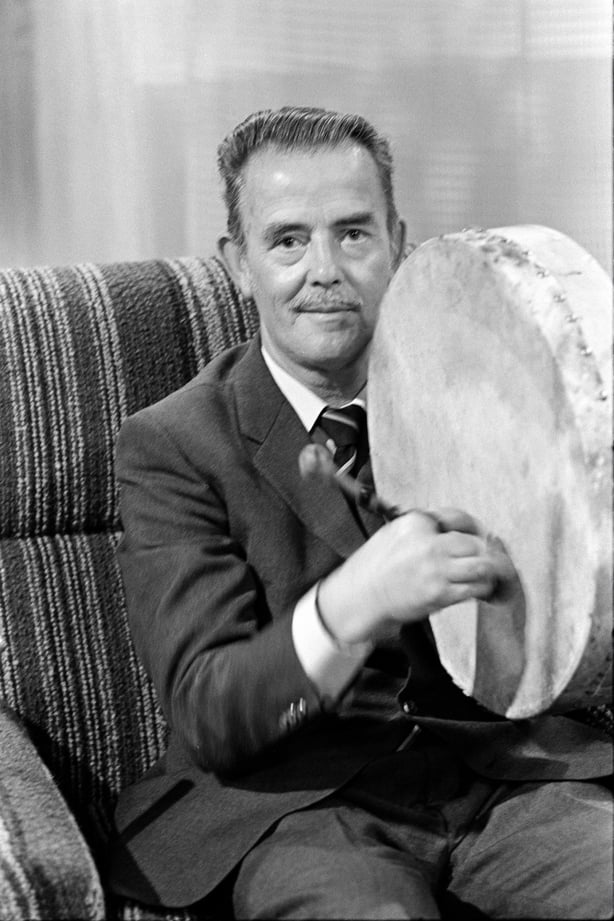In 1974, at the age of 60, Peadar Mercier, a part-time traditional musician and member of the Chieftains, left his job as a building supplies store manager with G&T Crampton construction company in Dublin to embark on an international career as Ireland’s first professional bodhrán and bones player.
Herbert Peter Mercier was born in Cork, in 1914. His father, a Protestant Congregationalist, came from a Northern family of jewelers, clockmakers and silversmiths. His mother came from a Catholic family in Cork, which hadstrong connections to the Irish Volunteers. The Mercer family moved to Bray, County Wicklow, in the 1920s, and it was here that Herbert Peter’s interest in the Irish language and culture blossomed. Throughout the 1940s and 50s, he wrote poetry and songs, was a renowned debater, and indulged his passion for dancing at Conradh na Gaeilge céilís and at the Arcadia Ballroom in Bray. Immersed in this urban community of language enthusiasts in Bray, and making regular visits to Connemara to improve his Irish, Herbert Peter Mercer went through a process of identity transformation, and became Peadar Mercier.

The bodhrán first came to widespread notice in 1959 when it was played by the character of Carthalawn in John B. Keane’s play Sive. Its status as a musical instrument was elevated considerably in the following years, when the Irish composer and performer Seán Ó Riada took up the instrument as director of his newly formed group Ceoltóirí Cualann.
Peadar’s involvement in the Irish language scene led him to take up the bodhrán in his late 40s. At the time, in the late 1950s, the goatskin frame drum was hardly considered to be a musical instrument. There were very few bodhrán players or bodhrán makers, and it was not easy to come by an instrument, and so Peadar made his own and taught himself to play it. Just a few years later, he was introduced to Seán Ó Riada, who invited him to perform with a group of musicians he was directing for a Damer Theatre production in Dublin. This would eventually lead to Peadar playing with Ó Riada’s Ceoltóirí Cualann and The Chieftains.

Initially, Peadar’s playing style was very much of its time, with a technique, rhythm and sound that owed more to the loud, outdoor style associated with the annual St Stephen’s day wren procession than the indoor concert stage. It wasn’t long, however, before he began to pioneer a new, more refined, modern style of playing the bodhrán. Peadar played with the Chieftains for ten years, recorded four LPs with the group, and performed on stages across Ireland, the UK, Europe and America. Many who heard him play on recordings or who saw him perform live were inspired to take up the instrument, and in that way he set in motion the dramatic developments in bodhrán playing that followed over the next 50 years.
Peadar Mercier had ten children. He taught his sons, Paul and Mel to play the bodhrán, and the instrument has been at the heart of Mel’s musical life ever since. When he was a teenager, Mel played bodhrán duets at home with his father and later, throughout the 1980s, father and son took their improvised duet onto the international stage to perform with the influential American composer, John Cage, and the Merce Cunningham Dance Company.
Peadar Mercier inspired a whole new generation of bodhrán and bones players - including his son Mel, a renowned performer, who after 25 years of lecturing at University College Cork, was appointed Professor of Music and the first Head of the UCC School of Music and Theatre. In March 2016, Mel was appointed Chair of Performing Arts at the Irish World Academy of Music and Dance at the University of Limerick.
Twenty-five years after the death of Peadar, the first ever-professional bodhrán and bones player, his son Mel gathers together the traces of his father’s musical life into a memory space of voices and music. Interwoven with the words of father and son, Peadar’s story is told by family, friends and musicians, and is underscored by the pulse and rhythms of his music.
Documentary On One: Peadar Mercier will be broadcast on Saturday September 10th @1pm on RTÉ Radio 1, with a repeat on Sunday September 11th @7pm on RTÉ Radio 1. You can listen to it here.

